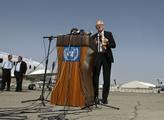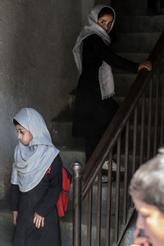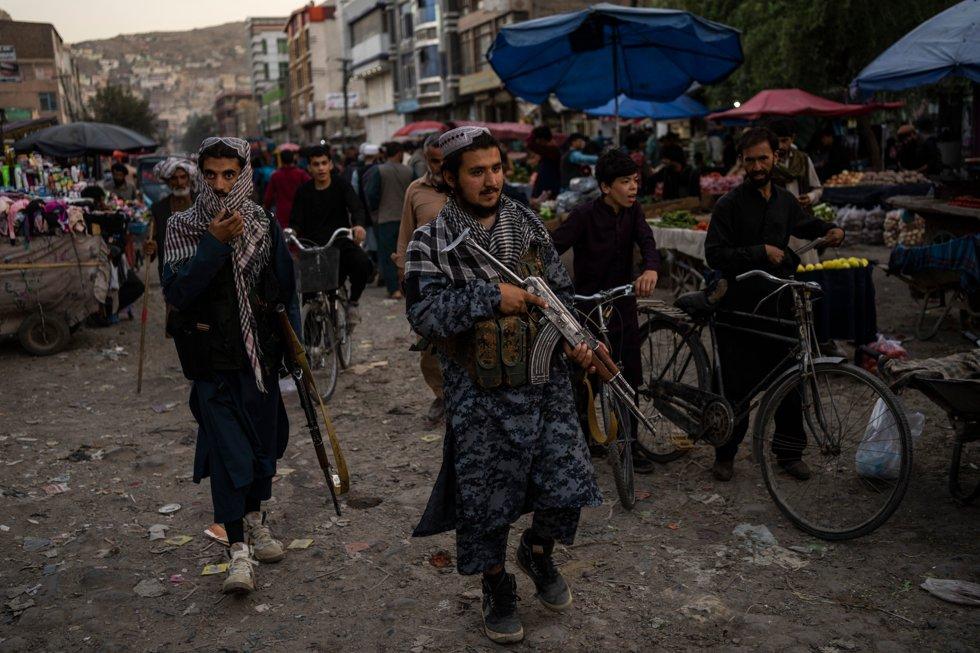– Millions now have higher education. An entire generation of Afghans has been built up who have the ability to build the country, says Kai Eide.
Few Norwegians have followed Afghanistan more closely than the former top diplomat. Eide has been Norway’s ambassador at a number of Norwegian foreign service missions, as well as to both the OSCE and NATO. From 2008 to 2010, he was the UN Special Envoy to Afghanistan.
Despite the war, and the fact that a huge number of Afghans are still living in deep poverty, Afghanistan has had a positive development in a number of areas in the last two decades. Income per capita has doubled, and life expectancy has increased by nine years. Children go to school longer, and the number of students has increased tenfold, according to the UN Development Program. And perhaps the most sensational “news” in the series of advances:
When the Taliban occupied Kabul in mid-August, 40 percent of schoolchildren were girls – unthinkable when the movement last came to power.
Eide says that he was surprised when he visited Afghanistan a few years after he left his job as a UN special envoy.
“Young, well-educated Afghans had taken over the work in the Ministry of the Interior from foreign advisers,” he says.
– A completely different country
In addition to “gigantic” advances in the field of education, as well as the fact that Afghanistan has built up democratic institutions, Eide points out that there are now hospitals and clinics in most of Afghanistan’s provinces. He says the health sector has completely transformed in twenty years.
– In some areas, there are relatively advanced health systems with, depending on the conditions, a good standard. A basic health service has been built up that now covers the vast majority of the Afghan population, says the former top diplomat.
Eide also points to the progress that has been made in Afghans’ access to information, in the opportunities for expression.
– A rich media landscape has emerged, without censorship – to which a large proportion of the Afghan population has access. The public discourse has been characterized by dissent, and this newfound freedom of expression is also closely linked to women’s rights, that a movement has emerged that is able to bring a conversation about women’s position into the public sphere, says Eide.
Taliban fighters patrol the market in Kabul’s old town after the movement took control of Afghanistan’s capital. “The Taliban has probably changed something, but they have never been in a situation where they had to manage everything that has now been built up,” says Kai Eide. Photo: Bernat Armangue / AP / NTB
—-
Looting and lawless conditions
Kai Eide believes President Ashraf Ghani left Kabul because he feared for his own life.
– He finally realized that the battle was lost. The news that the president had disappeared during the night shocked everyone and led to a power vacuum, with lawless conditions and extensive looting. It triggered the chaotic evacuation. And there was also a breach of an agreement with the Taliban, where the president would not leave the country until an interim government was in place, precisely to avoid chaos. The Taliban had promised not to enter Kabul pending the completion of this process. Sources in the movement tell me that in this situation they took Kabul to fill the void that arose. I actually believe them in that, says Eide.
– What do you think about the Taliban’s ability and ability to take care of everything that has been achieved, for example in the education sector?
– They understand that education is important, and do not want to put a line over everything that has been achieved. But they say that they should look at everything according to Islamic traditions and Afghan culture, and that is the key to understanding how they will shape the education system in the future. The regime’s approach is already affecting women’s education.
 –
–
Kai Eide arrives in Kabul as the UN’s new special envoy in March 2008. Since then, Afghanistan has seen great progress, but after the Taliban’s takeover, much is uncertain. Foto: Omar Sobhani / Reuters / NTB
—-
Eide also points to the Taliban’s signals about women’s sports.
– They have stated that women are not allowed to play sports because there is a danger that skin will appear. That says a lot about which line the Taliban will take. Women’s rights and freedom of expression will undoubtedly be severely weakened.
The Taliban is a rebel movement that has been on the battlefield for decades, Eide points out.
– They have never been in a situation where they had to manage everything that has now been built up. They have probably changed somewhat since the last time they came to power, but they have never dealt with all the tools a modern society is set up with.
Eide believes that the Islamist movement is completely dependent on using the part of Afghanistan’s population that has an education and that has worked in ministries and other institutions.
If they are to succeed, they must build trust. At the moment, they are going in the wrong direction – and many of the ministries are now just empty shells. The Taliban is dependent on filling them with knowledge. It will be challenging, also because there is a lack of money for operations, to pay salaries, as Western countries have frozen Afghanistan’s own funds in foreign banks and large parts of the aid, says the former top diplomat.
– Hardlinerne has control
Kai Eide believes the Taliban are now in dialogue with themselves about how they should relate to the West.
– Today it seems that it is the conservative forces within an already quite conservative movement that have the upper hand.
– Men eIs there a difference between the Taliban we see today – and the Taliban who negotiated?
– Yes, they now show a tighter attitude than what I experienced in Doha. But there have always been differences between the political commission – the negotiators we met in Doha – and the military part that has been on the battlefield in Afghanistan.
– There were recent reports of a dispute between Taliban’s new refugee minister Khalil ur-Rahman Haqqani from the Haqqani network and Deputy Prime Minister Abdul Ghani Baradar. Baradar reportedly left Kabul?
– This is a key point. How the Taliban’s inner dynamics will unfold in the future. The composition of the new government, characterized by hardlinere, is a big disappointment. I had indirect contact with Baradar already in 2009 because we identified that he was among the Taliban leaders who advocated a line of negotiation, says Eide.
He says that Baradar was an important point of contact, but that at one point he was placed under house arrest by Pakistani intelligence.
– And then, overnight, we lost all dialogue with the movement. When he was released and took over the leadership of the Doha negotiations, it was a confirmation that he was important for the dialogue. There are enough contradictions between him and the Haqqani network, which now dominates the leadership in Kabul, but I do not think Baradar is out of the game. Such discussions show that there is disagreement within the Taliban about the way forward.
– Maybe I was too naive
– What would you do differently, if you could travel back in time, and take up the job as the UN Special Envoy again?
– I wanted to make sure I had greater knowledge of Afghan culture and history before I started working. I would also be even clearer on the necessity of negotiations, before it is too late. In addition, I would insist that countries that require the UN to coordinate civilian and political efforts, also give the UN space and competence to carry out such coordination, says Eide.
He thinks about it, looking back to when the negotiations started in Qatar’s capital Doha.
– At the time, it struck me that there were several things that would be impossible to agree on, that there were simply no compromises. One was about the future political system, with free elections. The Taliban delegation never uttered a word of choice. Finding a compromise between the Taliban’s emirate and a democratic republic would probably be impossible. The second was on women’s rights, where the Taliban always emphasized that women should have all rights, but with the addition “in line with Islamic tradition and Afghan culture.”
 –
–
When the Taliban last held power in Afghanistan, almost only boys were allowed to go to school. 20 years later, the number of students has increased tenfold, and around 40 percent of the students are girls. – The Taliban understands that education is important, and does not want to put a line over everything that has been achieved. But they say that they should look at everything according to Islamic traditions and Afghan culture, and that is the key to understanding how they will shape the education system in the future, says Kai Eide. Photo: Bulent Kilic / AFP / NTB
—-
– Maybe I was too naive when I thought that a negotiated solution was possible. But it is not just the Taliban that is to blame for this failure. Until quite recently, Ghani and his team believed that it was possible to win the war militarily, and the hesitation of Ghanis contributed to not finding a solution. And for many years there was also no great enthusiasm for negotiations from the international community. On both sides, many believed in military victory. But the biggest responsibility for the sad development still lies in the rather one-sided agreement Trump entered into with the Taliban.
The precarious economic situation and the preliminary signals from the new regime put Western countries in a huge dilemma, according to the former top diplomat.
– It will be an extremely hard autumn and winter for very many Afghans. I think it is fair to say that we are facing a famine. The international community will probably go to great lengths to provide humanitarian support, but emergency aid is not enough now. We must help ensure that the water and electricity supply continues, that people have access to hoisting services, that children have a school to go to, says Eide.
He believes Afghanistan is a good example of the human rights dilemmas.
– Should one protest so strongly against a country’s authorities that one punishes ordinary people? Or should one prioritize limiting human suffering – and thus go beyond one’s own ideals?
– Is this the dilemma of the times we are now facing in Afghanistan?
– It is at least among the biggest dilemmas of our time. But we probably have no choice but to focus on the lives and health of the Afghan people. This means that one must swallow some camels and find an acceptable degree of commitment.
– So what should the authorities of Norway and allied countries do, specifically?
– I think they have to adjust to cooperation with the new regime. One of the most important is to release funds, both those Afghanistan has in foreign banks and for aid programs initiated by the World Bank and the IMF. Norwegian authorities should aim for freezing to be unacceptable. We need to start there so that the economy does not collapse. It is the Afghan people who are most important now, says Eide.
(This article was first published on Current aid).
– .


